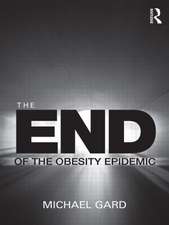Killer Fat: Media, Medicine, and Morals in the American "Obesity Epidemic”
Autor Natalie Boeroen Limba Engleză Paperback – 11 aug 2013
In the past decade, obesity has emerged as a major public health concern in the United States and abroad. At the federal, state, and local level, policy makers have begun drafting a range of policies to fight a war against fat, including body-mass index (BMI) report cards, “snack taxes,” and laws to control how fast food companies market to children. As an epidemic, obesity threatens to weaken the health, economy, and might of the most powerful nation in the world.
In Killer Fat, Natalie Boero examines how and why obesity emerged as a major public health concern and national obsession in recent years. Using primary sources and in-depth interviews, Boero enters the world of bariatric surgeries, Weight Watchers, and Overeaters Anonymous to show how common expectations of what bodies are supposed to look like help to determine what sorts of interventions and policies are considered urgent in containing this new kind of disease.
Boero argues that obesity, like the traditional epidemics of biological contagion and mass death, now incites panic, a doomsday scenario that must be confronted in a struggle for social stability. The “war” on obesity, she concludes, is a form of social control. Killer Fat ultimately offers an alternate framing of the nation’s obesity problem based on the insights of the “Health at Every Size” movement.
In Killer Fat, Natalie Boero examines how and why obesity emerged as a major public health concern and national obsession in recent years. Using primary sources and in-depth interviews, Boero enters the world of bariatric surgeries, Weight Watchers, and Overeaters Anonymous to show how common expectations of what bodies are supposed to look like help to determine what sorts of interventions and policies are considered urgent in containing this new kind of disease.
Boero argues that obesity, like the traditional epidemics of biological contagion and mass death, now incites panic, a doomsday scenario that must be confronted in a struggle for social stability. The “war” on obesity, she concludes, is a form of social control. Killer Fat ultimately offers an alternate framing of the nation’s obesity problem based on the insights of the “Health at Every Size” movement.
Preț: 285.34 lei
Nou
Puncte Express: 428
Preț estimativ în valută:
54.60€ • 58.39$ • 45.52£
54.60€ • 58.39$ • 45.52£
Carte tipărită la comandă
Livrare economică 18 aprilie-02 mai
Preluare comenzi: 021 569.72.76
Specificații
ISBN-13: 9780813564852
ISBN-10: 0813564859
Pagini: 192
Ilustrații: 3 tables
Dimensiuni: 152 x 229 x 15 mm
Greutate: 0.29 kg
Ediția:First Paperback Edition
Editura: Rutgers University Press
Colecția Rutgers University Press
ISBN-10: 0813564859
Pagini: 192
Ilustrații: 3 tables
Dimensiuni: 152 x 229 x 15 mm
Greutate: 0.29 kg
Ediția:First Paperback Edition
Editura: Rutgers University Press
Colecția Rutgers University Press
Notă biografică
NATALIE BOERO is an associate professor of sociology at San Jose State University. She is the author of “Bypassing Blame: Bariatric Surgery and the Case of Biomedical Failure” in Biomedicalization: Technoscience, Health, and Illness in U.S. Biomedicine and “Fat Kids, Working Moms, and the ‘Epidemic of Obesity’: Race, Class, and Mother-Blame,” in The Fat Studies Reader.
Recenzii
"This is a timely and thoughtful book. It clearly reveals the disconnect between public pronouncements on obesity and what a great many fat people experience in their own lives."
"[Boero] deals with an accusation of the media for the spread and perpetuation of the 'obesity panic,' ... the role of medical intervention, especially bariatric surgery, for obese individuals, and of government activites in harnessing this 'postmodern epidemic' and in the now open warfare against obesity waged by public health officials. Recommended."
"Boero’s analysis provides an insightful perspective on the framing of the obesity epidemic. Her book is an engaging and fascinating read, as well as a vital contribution to medical sociology."
"Boero weighs in powerfully for healthy sanity in the 'war against obesity.' Killer Fat clarifies complex science, punitive clinical care, and the relentless screech of the media with aplomb. Brava!"
"This book is both an enjoyable read and incredibly informative. Written in a style that is both authoritative and accessible, Natalie Boero's Killer Fat is a must-read for anyone seeking to understand the so-called 'Obesity Epidemic.'"
"Killer Fat is a significant contribution to the project of skepticism about the so-called 'obesity' epidemic and a compassionate exploration of the burdens it imposes on individuals' lives."
Descriere
Killer Fatexamines how and why obesity emerged as a major public health concern and national obsession in recent years. Using primary sources and in-depth interviews, Boero enters the world of bariatric surgeries, Weight Watchers, and Overeaters Anonymous to show how common expectations of what bodies are supposed to look like help to determine what sorts of interventions and policies are considered urgent in containing this new kinds of disease.
















